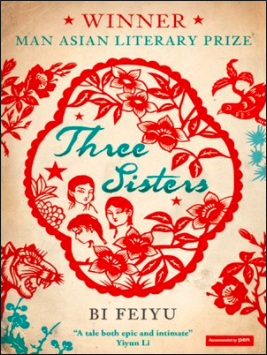|
Three Sisters by Bi Feiyu, Translated by Howard Goldblatt and Sylvia Li-chun Lin Book Group 1 – January 2018
|
|
|
|
Set in a rural village and town in China as the Cultural Revolution was coming to an end in 1971/2 and 10 years later, Three Sisters is about Yumi, the eldest, Yuxiu, the third, and Yuyang, the youngest of seven sisters of the Wang family. Bi Feiyu follows the sisters trying to break away from village and family life and make something more of their lives against a background of their father’s infidelities and fall from power from the Communist Party; jealousy amongst the sisters themselves; and treachery and jealousy within the village and the consequences this has on the lives of each sister.
The author divides the novel into three sections -Yumi, Yuxiu and Yuyang - essentially following the lives of each sister from their late teens. It was felt there was a certain theatricality in the style of the novel - each section could be the act of a play moving from village to town and then to another part of town. The author cleverly uses Yumi as continuity to link each section. and the river to act as the means to get from the village to the town and then to the wider world.
Bi Feiyu’s descriptive and poetic language was commented on and his ability to bring characters to life. The first two sections - Yumi and Yuxiu - were felt to be the strongest and most successful parts of Three Sisters both in portrayal of the two sisters' characters and situations and in the flow and continuity of the dialogue. The group almost unanimously felt the third section - Yuyang - could have been a separate short story and was the least satisfactory part of the book. The dialogue did not flow in the same way as the earlier sections, the characters seemed less real and the ending, which was also the end of the book, was felt to be unsatisfactory. Three Sisters gives the reader an insight into the life and the culture in China at the end of the Cultural Revolution but it was not a book that the group had all enjoyed reading. Some members of the group also questioned whether it was a worthy winner of the Man Asian Literary Prize.
Jane Duxbury |





